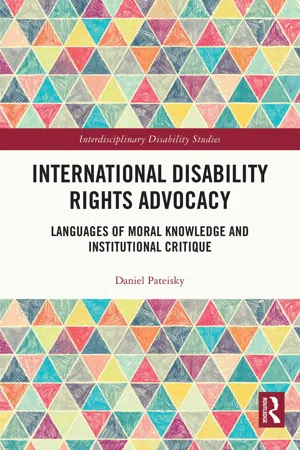
International Disability Rights Advocacy
Languages of Moral Knowledge and Institutional Critique
Daniel Pateisky
- 198 Seiten
- English
- ePUB (handyfreundlich)
- Über iOS und Android verfügbar
International Disability Rights Advocacy
Languages of Moral Knowledge and Institutional Critique
Daniel Pateisky
Über dieses Buch
This book provides insight into the globally interlinked disability rights community and its political efforts today. By analysing what disability rights activism contributes to a global power apparatus of disability-related knowledge, it demonstrates how disability advocacy influences the way we categorise, classify, distribute, manipulate, and therefore transform knowledge.
By unpacking the mutually constitutive relations between (practical) moral knowledge of international disability advocates and (formal) disability rights norms that are codified in international treaties such as the UN Convention on the Rights of Persons with Disabilities (CRPD), the author shows that the disability rights movement is largely critical of statements that attempt to streamline it. At the same time, cross-cultural disability rights advocacy requires images of uniformity to stabilise its global legitimacy among international stakeholders and retain a common meta-code that visibly identifies its means and aims. As an epistemic community, disability rights advocates simultaneously rely on and contest the authority of international human rights infrastructure and its language.
Proving that disability rights advocates contribute immensely to a global culture that standardises what is considered morally and legally 'right' and 'wrong', thereby shaping the human body and the body politic, this book will be of interest to all scholars and students of critical disability studies, sociology of knowledge, legal and linguistic anthropology, social inequality, and social movements.
Häufig gestellte Fragen
Information
1 Introduction
- How do international disability rights advocates shape power-knowledge around dis/ability?
- Whence does this heterogeneous field of knowledge draw its authority?
- What role do disability rights advocates ascribe to language and law in their work?
Intertwined ap...
Inhaltsverzeichnis
- Cover
- Half Title
- Series Page
- Title Page
- Copyright Page
- Dedication
- Table of Contents
- Lists of figures
- Glossary of abbreviations and notes on terminology
- 1 Introduction
- Part I
- Part II
- Index